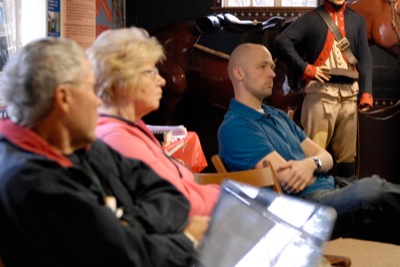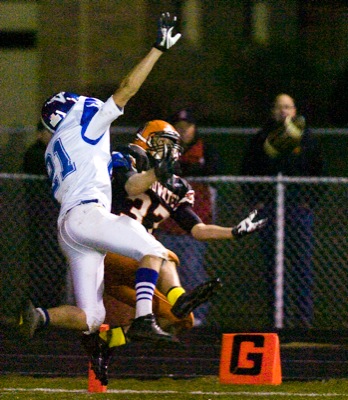Monday, November 5th, 2012
Funding stalls for fertilizer plant
Company now hopes to construct manure processing unit to travel to local farms
By Nancy Allen
A plan by a Wisconsin company to build a plant off U.S. 127 that turns manure into organic fertilizer has stalled.
Terry Mescher, an agricultural engineer with the state of Ohio, reported the news during Saturday's meeting of the nonprofit Lake Improvement Association.
"Their (Amiran Technologies) funding never did come through, but we still have some folks locally who want to start a small operation to encourage some funding," Mescher said. "We hope Amiran will still work with us on a smaller facility; it's on a wait and see status."
Amiran officials first pitched the idea to local officials more than a year ago and have demonstrated the technology using hog manure. Company and local officials have touted the plant, Ag Conversions Ohio Grand Lake Watershed Facility, as a way to deal with excess manure in the local watershed. Manure contains phosphorous, the main nutrient feeding toxic algae blooms in the 13,500-acre Grand Lake.
Plans to break ground this past spring on the $11 million facility near the intersection of U.S. 127 and state Route 119 were pushed back as the company asked if local residents were interested in investing in the facility. In August, company officials announced it was $2 million short in funding because a private equity firm had backed out.
Company spokesman Paul Chadwick this morning said the company still plans to build some sort of facility or mobile processing unit that could be taken from farm to farm. The cost for either is estimated at between $2 and $4 million, he said.
"We really want to come to Celina, but we are really hamstrung by finances right now," Chadwick said today. "We are still looking for funds and investigating options."
Chadwick said the Wisconsin-based company has personally invested $600,000 in travel, demonstrations and other legwork associated with bringing the facility to Mercer County.
Amiran officials also have proposed building a facility that turns sediment dredged from Grand Lake into potting soil.
Also at Saturday's LIA meeting, a plan to build a $300,000 oil derrick replica in the middle of Grand Lake was put on hold due to negative public feedback.
The plans called for a 30-foot tall replica to be placed on a 55-foot diameter area surrounded by seawall in the center of the lake where one of the last remaining derricks once stood. LIA members Dave Meyer and Kate Anderson pitched the project at the September meeting and planned to launch a local fund drive.
"Due to popular demand, we are putting the project on hold for now," Meyer said. "It's not a dead issue; maybe we'll fire it up in a year or two."
LIA President Tim Lovett said the timing was bad and it was difficult to justify spending the money on the project in light of the lake's poor water quality.
LIA officials had said the derrick would highlight the lake's oil history and draw visitors. The first offshore oil well in the world was erected on Grand Lake off Villa Nova in 1891, and during the next seven years, hundreds of derricks dotted the lake and the land surrounding it.
Mescher took questions from the crowd about pending manure rules for lake watershed farmers.
The lake watershed was designated distressed by the state on Jan. 18, 2011, after humans and animals were sickened by toxins in the lake. The designation triggered new manure rules designed to stop nutrient runoff.
One of the new rules says watershed farmers must have completed a nutrient management plan by Dec. 15. Mescher said five to 10 farmers won't be able to complete their plans because they do not have enough land for manure application.
Another rule that starts Jan. 19 will prohibit farmers from applying manure in the lake watershed between Dec. 15 and March 1 unless the farmer gets approval from the state. This exception was made for farmers who may have storage overflow issues caused by rain.
Mescher said the state will look at several issues when deciding whether to give a farmer permission to apply.
"The state will look at the circumstances that brought them to needing to haul, how full is their manure storage and did they try to get application done before the date," he said. "They might get a denial saying they have to take it to Mike's Sanitation or you can apply but you must follow all protocol of practice standard 633."
The practice standard lays out how to best apply manure so it does not cause runoff or pollution.
If a farmer receives permission from the state to apply during the prohibited dates, he must notify the Mercer County Soil and Water Conservation District office prior to applying, Mescher said
Mescher also reported a test he ran using swine manure only settled out 60 percent of the phosphorous. He was hoping for at least 75 percent. The goal was to concentrate the phosphorous in the manure to reduce transportation costs for hauling waste out of the watershed.
"At 60 percent, it makes it difficult to justify the economics of trucking it in my opinion," he said. "It's just not quite good enough.
Mescher wants to run the test again in the spring.
Mescher also reported a positive preliminary test was completed recently using chemical additives to remove phosphorous from swine manure. He did not reveal the name of the company that performed the test.
"They want to see if they can get a service set up here locally and broker the manure like poultry manure is now," he said. "They want to start processing manure next year."
Portable equipment that could travel from farm to farm would be used, he said. Mescher would not divulge the company's name, as plans are being finalized.
After the floor was opened for member comments, former LIA President Bill Ringo said farmers and the state aren't working fast enough to fix the lake.
"We're told that because it's going to cost a producer to fix the problem, we're forced to lose money in our homes and our livelihoods," Ringo said.
Lovett asked Ringo how the problem could be fixed, to which Ringo replied, "keep your farm on your farm," referring to manure runoff.
A large round of applause followed.
"I don't think your assumption that nothing's being done is correct," Lovett said. "I prefer to start working with people and moving forward; this is a people issue where we have to work together, not say it's your fault and you've got to fix it."
Lovett said if members disagree with the course of action the LIA has taken on the issue, they can vote to change the nonprofit's leadership at the next meeting on Dec. 1, when new officers will be elected. Anderson is running against Lovett for president.





